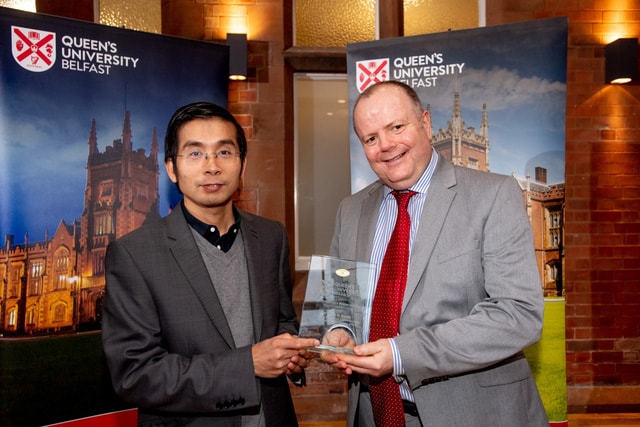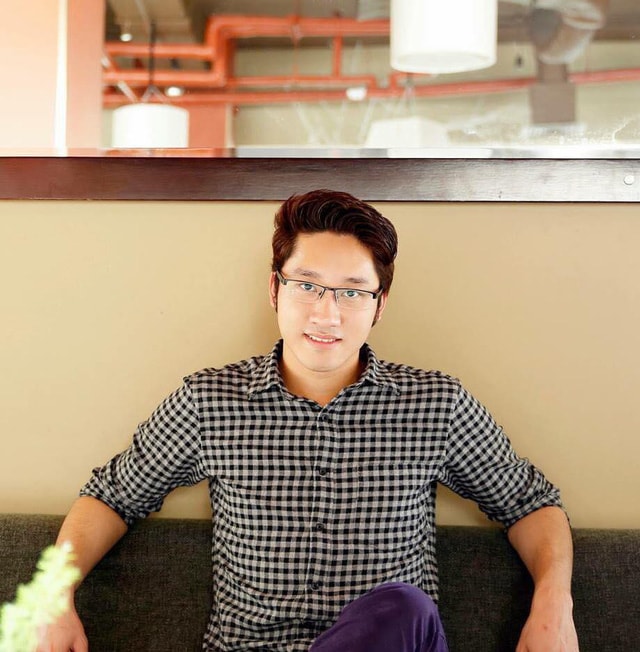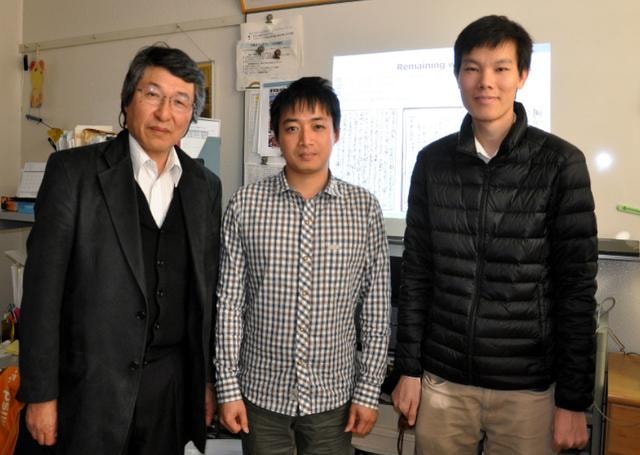4 Vietnamese scientific researches honored abroad in 2018
With groundbreaking scientific research projects that are meaningful to society and the community, outstanding Vietnamese scientists/researchers were honored in their home countries in 2018.
Vietnamese Professor Wins “Innovative Research of the Year 2018” Award at UK University
On December 11, 2018, Professor Duong Quang Trung was honored to be one of two outstanding scientists to receive the 2018 Research Innovation Award from Queen's University (UK).
Talking about the Research Innovation award, Professor Trung said that he and his colleagues at Queen's University Belfast (QUB) have improved the communication system to respond to the problem of signal transmission when natural disasters occur.
 |
| Professor Duong Quang Trung was honored by Queen's University, UK for his innovative research in 2018. |
Their research was awarded the 2017 Newton Prize, receiving £200,000 from the British government to develop a new information transmission system using unmanned aerial vehicles (UAVs) that can operate in extreme weather conditions and at times of natural disasters. Professor Duong Quang Trung is the leader of this research project.
In extreme weather conditions or natural disasters, technology can make a huge difference, helping to save lives and provide support to those living in disaster-affected areas. UAVs can play a vital role in this, as they can reach affected groups and deliver necessary resources.
“Communication under difficult conditions to support disaster management such as firefighting, rescue and emergency medical services, time is an important factor (e.g. with minimum latency from milliseconds to seconds),” said Prof. Trung.
During and after natural disasters, telecommunications infrastructure is often disrupted, making it difficult for emergency responders and evacuation teams to complete their missions. By reducing the processing time of UAV communications to milliseconds, the optimal resource allocation algorithm for UAVs developed by Prof. Trung and his colleagues could help save lives and provide timely assistance to survivors.
Young Vietnamese scientist discovers 8 new species of bacteria
In 2018, Nguyen Viet Hung (born in 1990, Hanoi), a PhD student at the University of New South Wales, discovered 8 new species of bacteria. The 28-year-old scientist was the only Vietnamese invited to speak at the ISME17 Microbiology Scientific Conference - the largest scientific conference in the field of Microbiology in the world held in Germany. He was honored to be selected into the list of 300 speakers whose research papers were selected to present to more than 2,000 delegates and scientists at the Ecology and Microbiology symposium.
Hung's research has discovered 8 new species of bacteria that have special significance when applied in practice. Talking to PVPeople's Intelligence, Viet Hung said: “The application of the project is that when needed, bacteria can be planted to develop beneficial factors for crops and livestock. For example, in the Mekong Delta, many aquaculture areas are affected by disease, and crustacean species die en masse.
The initial cause is due to environmental changes, alluvium causes beneficial bacteria in that environment to disappear, leading to ecological function degradation. Substances such as hydrogen sulfate or ammonia can increase sharply, killing all the aquaculture products.
Then research can be applied to transplant beneficial bacteria that can survive in this environment to recreate the necessary ecological functions for the farming area.
 |
| Nguyen Viet Hung, a PhD student in Genetics and Molecular Biology at the University of New South Wales (Australia) – a young Vietnamese scientist has discovered 8 new species of bacteria. |
The method Hung has researched allows to find a unique environment that has all the DNA of bacteria species. There are strange bacteria that cannot be found but can be detected by this technology.
The research work of the 9X Viet made a strong impression on the scientific council, and was fully sponsored to travel to Germany to present alongside the work of the world's leading professors and scientists from Harvard, Stanford, and MIT.
Notably, these 8 species of bacteria belong to 7 completely new orders of the Gammaproteobacteria class – a surprising discovery, as only 14 orders of Gammaproteobacteria have been discovered by scientists in the past 200 years. With this impressive work, in October 2018, the Vietnamese PhD student was invited to Shanghai, China to continue presenting his research thesis.
Vietnamese guy makes his mark on the world's "artificial intelligence" arena
In 2018, Tran Dang Dinh Ang - a final year medical student and his team were listed in the top 10 of the Data Science Bowl competition (even reaching 2nd place at one point). This is one of the most prestigious competitions in the scientific community in general and the field of artificial intelligence development in particular.
This year's competition theme is "Automatically identify and control the number of nuclei on any slide." According to experts, this is an extremely time-consuming task and is closely related to the development of new treatments for many major diseases: from influenza to diabetes, Alzheimer's or even cancer.
Being in the top 10 will help contestants introduce their effective models to the world, attracting partners and visionary investors.
On June 27, Virtus Health - a leading group providing artificial insemination (IVF) services in Australia, announced a scientific invention called Ivy. This pioneering invention is based on artificial intelligence (AI) technology and was developed by Tran Dang Dinh Ang.
 |
| Dinh Ang is currently the President of the Cardiology Medical Student Association at the University of New South Wales. |
Sharing about his invention, Áng said that in 2017, while studying IVF, he approached Dr. Simon Cooke, Scientific Director of IVFAustralia, an artificial insemination facility based in Sydney and part of the Virtus Health Group. Dr. Cooke shared with the students the challenges of IVF specialists in embryo selection. After class, Áng met with Dr. Cooke to boldly propose a partnership with him and IVFAustralia.
After a year of research with data from more than 2,661 IVF cases from Virtus Health, Ang successfully created an "artificial neural network" capable of scoring human embryos during development. Ang named this artificial intelligence Ivy, inspired by the English word "artificial insemination" (IVF). This technology is more efficient and economical than selecting embryos by traditional methods, thereby helping doctors work faster and more accurately.
Since the beginning of 2018, Ivy software has been pre-clinically tested with more than 2,000 embryos at Virtus Health facilities in New South Wales and Queensland... The group has filed an application for patent registration and is preparing to conduct clinical trials at its laboratories in Australia and Europe this year. Dinh Ang hopes that after testing, Ivy will soon be introduced to Vietnam.
Vietnamese PhD student wins artificial intelligence competition in Japan
In March 2018, Ly Tuan Nam and Nguyen Cong Kha (international students at Tokyo University of Agriculture and Technology, in Koganei) excelled over 23 competing teams across the land of cherry blossoms, winning the championship of the artificial intelligence award for universities and colleges across Japan.
 |
| Professor Masaki Nakagawa (left, far right), who is the supervisor of Ly Tuan Nam and Nguyen Cong Kha at Tokyo University of Agriculture and Technology, said that the research of the two Vietnamese students will certainly be "very useful in studying Japanese history." |
The competition, which began in February 2017 and is sponsored by the Institute of Electronics, Information and Communications Technology (IEICE), asked teams to create the best artificial intelligence system to read the ancient Hiragana script, one of the two character sets of the Japanese language.
The product of the two Vietnamese guys is a three-layer neural network that simulates the function of the human brain and has learned to recognize a total of more than 300,000 ancient hiragana characters through images from 14 ancient handwritten manuscripts, including the famous work "A Passionate Life" by author Ihara Saikaku written in the Edo period. Thus, this artificial intelligence can read up to 96% of single characters and 88% of combinations of 3 characters.

